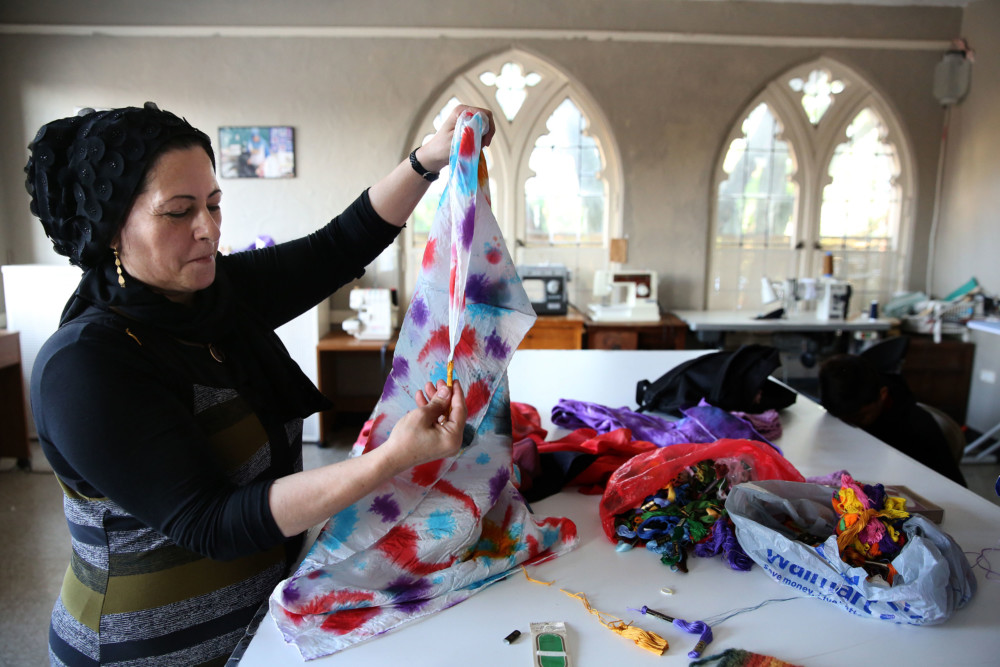By Alison Bowen
Chicago Tribune
WWR Article Summary (tl;dr) “The Loom” is a project of the Catholic Charities Refugee Resettlement Program. Volunteers teach refugees from places like Iraq crafting and jewelry making skills so that they can make money.
CHICAGO
Peering at the piece of paper, Saleemah Hammadi evaluated the pattern, a scarf with draping fringe. Scrunching her nose, she picked up a knitting needle. Put it down. Shook her head.
“Too big.”
She knows her needles. As a girl in Iraq, her mother taught her how to sew. Classes in a Baghdad classroom boosted her skills.
Now, on the second floor of a Lincoln Square church, she uses her craftsmanship to knit scarves that will be worn around Chicago.
Hammadi is one of the women in Loom, a project of the Catholic Charities Refugee Resettlement Program. Volunteers teach the women crafts, scarf patterns, tying tassels, creating jewelry _ that become a means of making money.
Because of privacy concerns, federal officials cannot confirm or deny someone’s refugee status. Kristine Kappel, communications director for Catholic Charities of the Archdiocese of Chicago, explains that women like Hammadi come to the program through the government.
When refugees arrive in the United States, the State Department connects them to authorized resettlement agencies, including the United States Catholic Conference of Bishops. Then, those organizations connect refugees to groups like Catholic Charities of the Archdiocese of Chicago, which runs Loom.
The women in Loom come from different countries and backgrounds. Some learned to sew as children; some are learning now.
“Saleemah can just look at a knit scarf and replicate it,” said Alexandra Sundet, who worked with the women until recently taking a new position at a different organization.
Hammadi is a vibrant presence. A wrinkle of her nose can destine a potential pattern for the wastebasket. A not-so-right seam is quickly unraveled and fixed before its creator notices. Standing over the work table, she suggests playing an Arabic Pandora station and dances.
She and husband Hakim arrived in the U.S. in 2012. During the Iraq War, they said, sectarian violence became so intense that fear of traveling around the city became fear of going outside.
“We cannot go to the hospital,” Hakim said. “We cannot go to the park.”
Arriving in Chicago meant deliverance from chaos. But it also meant adjusting to a new world.
It’s a feeling Elma Kulovic remembers.
“You’re always in survival mode,” she said. “You have such high hopes for a better life. We are like lottery winners.”
She came from Yugoslavia, where she was a lawyer, in 1996, along with her two children. She remembers struggling with basic tasks like selecting groceries.
She said the options overwhelmed her. She’d arrive home to unpack the bags and think, “What did I buy?”
As the program director for the Catholic Charities Refugee Resettlement Program, Kulovic helps women assimilate, from learning English to finding a proper winter coat.
Women at Loom arrive from Iraq, Bhutan and Malaysia. Artists keep 75 percent of the retail price; 25 percent goes to Loom for materials such as yarn.
Translators are available to help the women share stories and select materials.
These Tuesday afternoons offer a time to chat with friends, pick up materials or paint silk scarves to be sold at markets around the city.
Batool Al Wailli brings snacks for the women. In Iraq, Al Wailli worked in a library. Recently, she was able to return to visit her daughter and three sons.
Hammadi and Hlaiwah Hussein help those who are new to sewing.
“Hlaiwah can look at your shirt and sew it,” Sundet said.
The women also have strong opinions about trends.
Infinity scarves are deemed old news. This year, patterns show fringe, and matching sets of gloves and scarves.
Memories of home are often infused into the artwork. Painted vistas recall a view from a bedroom window; women remember a way to twist wire into intricate animals.
Paintbrushes create colorful splotches on silk. Every now and then, the women hold the scarves aloft to check symmetry.
The online store shows everything from knitted pillows to a woven leather belt to earrings crocheted by Hammadi.
The women encourage one another. They also help with cultural differences and learning English. Al Wailli coached Hussein on the “i” in her name. Hussein nodded, scratched it out and started again.
Often, refugees arrive from countries where women did not work outside the home. And even if someone previously practiced as a doctor or lawyer, training abroad isn’t automatically approved here.
For some women, a conversation at Loom might be the first time they’re directly asked for input, said Kulovic.
“In some cultures, this has never happened before,” she said.
Refugees who make it to the U.S. are rarely able to come with their entire families.
Hammadi’s four children are still in Baghdad.
“Always, I am worried,” she said. She constantly calls, “especially when I hear the news about another explosion.”
Since arriving, Hammadi and her husband have tried to bring their two sons and two daughters here. Despite interviews and medical tests, her husband said, the process has stalled.
“We have lost four years waiting for our family,” Hammadi said.
Loom has helped her find friendship and respite.
“I became relaxed,” she said, “and happy.”














































































































































































































































































































































































